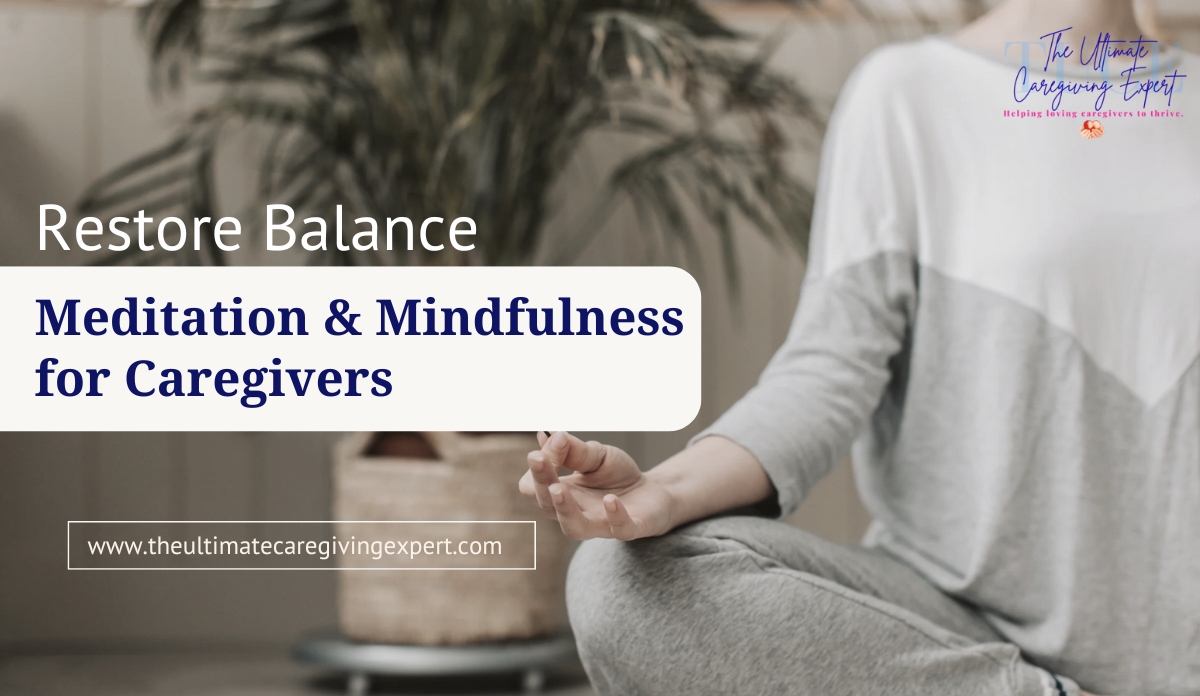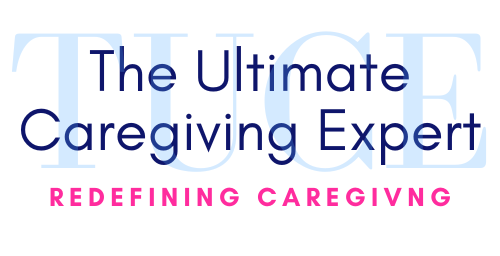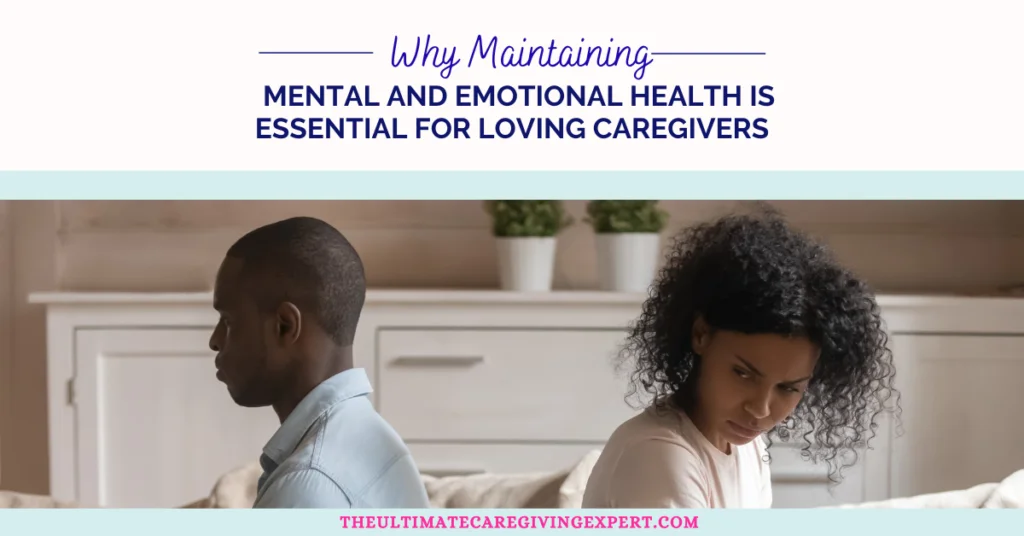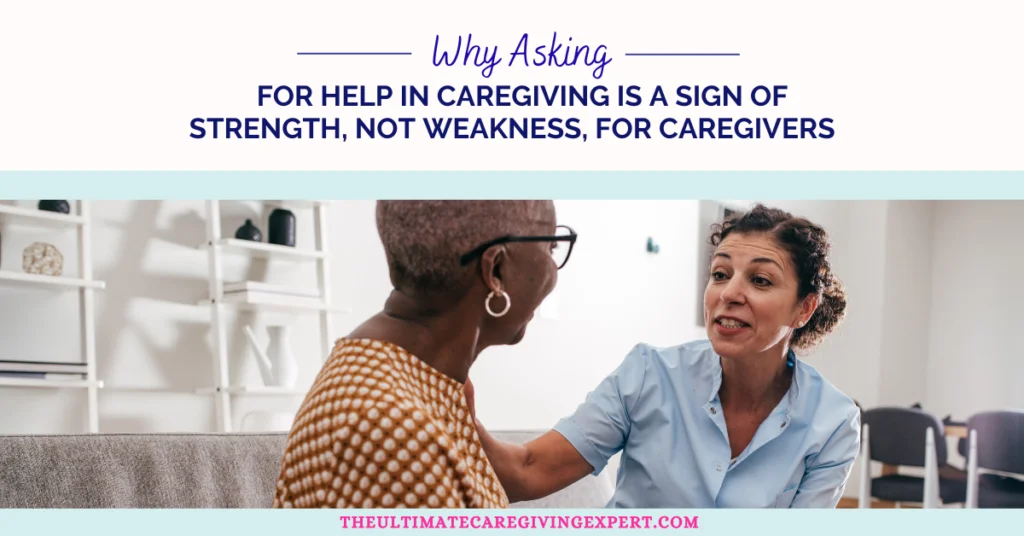Restore Balance: Meditation & Mindfullness for Empowered Caregivers

Meditation and mindfulness are powerful tools for caregivers. Caregiving is a rewarding but tough job that can leave you feeling stressed and worn out. Practicing meditation can help you feel better — I know this from personal experience. In this article, I will share easy meditation tips that can help you stay calm and focused. Keep reading to learn more and take control of your well-being.
Why Meditation and Mindfulness are Crucial for Caregivers
Caregiving is hard work. It can drain your energy, both mentally and physically. When you are focused on caring for someone else, it’s easy to forget about your own needs. The stress and exhaustion can build up quickly.
Meditation is an easy way to help you manage these feelings. Just a few minutes of meditation can help you feel calmer. It can clear your mind and reduce stress. Meditation helps you feel better, even when life feels overwhelming. It allows you to focus on the present and take care of yourself, so you can care for others.
I found that meditation made a big difference in my life. At first, I didn’t think it would help. But after just 10 minutes of quiet time each day, I felt less stressed and more patient. Meditation gave me a break from my busy day and helped me feel more in control. It didn’t make everything perfect, but it helped me manage the pressure better.
The National Institute on Aging provides numerous resources for caregivers, which can help them manage the challenges of caregiving.
For more tips on how to manage stress, check out Overcome Caregiving Stress.
Mindfulness for Caregivers
What is Mindfulness?
Mindfulness means paying full attention to the present moment. It’s about being aware of what you’re doing, without distractions or judgment. For caregivers, this can mean focusing on each task. It could be helping with a meal, taking a walk, or simply breathing. Mindfulness is not about doing more. It’s about fully experiencing what’s in front of you.
Benefits of Mindfulness for Caregivers
Mindfulness helps caregivers stay calm and focused. It reduces anxiety and emotional stress. When we’re mindful, we stop worrying about the past or the future. This allows us to deal with situations more clearly. For caregivers, this leads to more patience, better empathy, and less burnout. Mindfulness gives you the space to breathe and stay calm.
Practical Tips for Practicing Mindfulness
Mindfulness doesn’t need to take much time. Here are a few easy ways to practice:
- Mindful Breathing: Take a few minutes to focus on your breath. Inhale slowly, hold for a second, and then exhale. This simple act helps you reset during a busy day.
- Body Scan: Start at the top of your head and move down to your toes. Notice any tension or discomfort. This practice helps you relax and check in with your body.
- Mindful Listening: When you’re with the person you care for, listen carefully. Focus on their words and emotions. This helps you stay connected and aware.
I’ve found that just five minutes of mindful breathing or a body scan makes a big difference. These simple habits help me feel more in control. They allow me to approach caregiving with more patience and focus.
For more meditation tips, check out Meditation Practices for Family Caregivers.
Meditation and Mindfulness Techniques for Caregivers Dealing with Stress
Why Caregivers Experience Stress
Caregiving can be tough. It takes a lot of time and energy. You may feel like there’s never enough time for yourself. The long hours and emotional demands can quickly build up. This stress can feel overwhelming. But meditation can help. It can clear your mind and reduce your stress.
Effective Meditation Techniques
- Focused Meditation
One easy meditation is focused meditation. To start, find a quiet space and close your eyes. Breathe slowly in and out. Pay attention to the feeling of your breath. If your mind starts to wander, gently bring it back to your breath. Even just five minutes of this can calm you. - Loving-kindness Meditation
Loving-kindness meditation helps you feel more compassionate. It is also great for caregivers. Start by sitting quietly. Repeat phrases like, “May I be happy. May I be healthy.” Then, wish these things for the person you care for. This practice helps you connect with others while keeping your heart open. - Body Scan Meditation
Body scan meditation helps you relax. Lie down or sit comfortably. Start with your toes and focus on each part of your body. Slowly work your way up. Pay attention to any areas of tension. Breathe deeply and let the tension go. This practice can help release the stress you hold in your body.
Guided Meditation and Mindfulness Apps or Resources
Apps like Headspace and Calm can guide you through meditation. They offer short sessions that fit into a busy schedule. These apps can help you relax and reduce stress. They are a great way to start if you are new to meditation.
These meditation techniques helped me feel more at ease during caregiving. A few minutes of focused breathing or a quick body scan helped me relax and regain energy. Loving-kindness meditation helped me stay kind to myself and others. I encourage you to try these practices. They can help make caregiving easier to handle.
If you’d like more information on how to make caregiving more manageable, read Top 10 Requirements of a Family Caregiver.
Well-being Practices for Caregivers
Importance of Self-care
Caregivers often focus on others. But we must also care for ourselves. If we don’t, we can run out of energy. Self-care helps us recharge. It lets us give our best. Taking care of yourself is not selfish. It’s necessary to be a good caregiver. When you feel good, you can do more for others.
For tips on managing self-care and reducing caregiver stress, check out How to Adapt to Change: Flexibility in Caregiving.
Simple Well-being Practices
Self-care doesn’t have to be hard. Small things can help a lot. Stretching can relieve tension. Drink enough water to stay hydrated. Eat healthy foods to keep up your energy. Getting good sleep is also important. These small habits make a big difference. They help you feel better and more ready to care for others.
Self-compassion and Mental Health
Caregivers can feel guilty about taking time for themselves. But it’s important to show yourself kindness. If you don’t, stress builds up. Self-compassion helps you manage that. When I started being kinder to myself, I felt less stressed. I was able to give more to others. So, remember to treat yourself the way you treat the ones you care for.
In my experience, taking small steps to care for myself helped me feel better. These habits allowed me to be a better caregiver. I hope you’ll try them too—they can make caregiving easier.
Overcoming Challenges in Meditation
Common Obstacles Caregivers Face
As a caregiver, it can feel impossible to find time for yourself. You’re always busy, and self-care often takes a backseat. Fatigue and distractions can make it hard to meditate. I know how overwhelming it can be when there’s no time to breathe. But even with these challenges, meditation can help. The trick is fitting it into your day, no matter how hectic it feels.
Tips for Overcoming Obstacles
Start small. Make meditation a priority, even if it’s just for 5-10 minutes. You don’t need long sessions to feel better. Set a reminder to help you remember. Find a quiet spot, even if it’s just for a few minutes in a room or corner. You can do this, even on the busiest days.
If you struggle with motivation, keep it simple. Don’t worry about perfect meditation. Just do it, even if you feel tired. It’s about showing up for yourself. The more you practice, the easier it becomes. Soon, it’ll feel like a natural part of your routine.
I’ve faced these same struggles. There were days when I didn’t want to meditate. But by sticking with it, I started feeling calmer and in control. Meditation didn’t fix everything, but it helped me manage stress. I encourage you to give it a try. Even a few minutes can make a big difference.
Frequently Asked Questions (FAQ)
How much time do I need to meditate each day?
You don’t need much time. Even a few minutes can help. Just 5 to 10 minutes a day can make a difference. The key is to be consistent. The more you practice, the more benefits you’ll feel.
Can meditation help me with anxiety or depression as a caregiver?
Yes, meditation can help. It calms the mind and reduces stress. Studies show it can lower anxiety and improve mood. Meditation gave me a break and helped me feel more at ease, even when things were tough.
What is the best time of day to practice meditation?
The best time is when you can fit it into your day. Some people like to meditate in the morning. Others do it at night to relax. The key is finding a time that works for you.
Do I need to be a meditation expert to benefit from it?
No, you don’t need to be an expert. Start with simple practices like breathing exercises. Meditation is for everyone, even beginners. You can start small and build up over time.
Conclusion
Caregiving is tough. It takes a lot of energy, both physically and emotionally. But meditation and mindfulness can help. Just a few minutes each day can reduce stress, clear your mind, and help you feel better. These simple practices can make a big difference in your day.
It’s important to care for yourself, too. If you don’t, you can run out of energy. Taking time to meditate or be mindful helps you recharge. When you take care of yourself, you can take better care of others.
Ready to reduce stress and find more balance in your caregiving journey? Get my Caregiver Reset Bundle — packed with practical tools, guides, and tips to help you care for yourself while caring for others. Click here to grab your bundle now and start feeling calmer, more in control, and supported today!









Your blog is a constant source of inspiration for me. Your passion for your subject matter is palpable, and it’s clear that you pour your heart and soul into every post. Keep up the incredible work!
Explore a wealth of fascinating and practical resources on this site .
From expert articles to bite-sized insights, there’s something to suit all needs .
Enhance your knowledge with curated information built to educate and engage you .
This site delivers a user-friendly experience to help you find the information you need .
Connect with of thousands of users and rely on our high-quality content consistently.
Dive in today and discover endless possibilities this platform has to offer .
Hey, I just stumbled onto your site… are you always this good at catching attention, or did you make it just for me? Write to me on this website — rb.gy/3pma6x?Tal — my username is the same, I’ll be waiting.
I do try to talk directly to the caregiver, I am happy you are enjoying my post. Thank you and here if you need more.